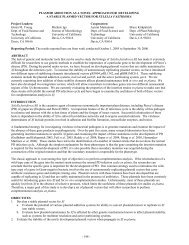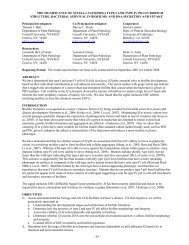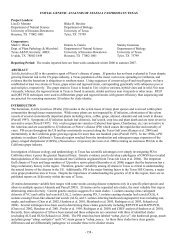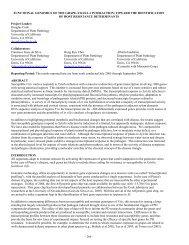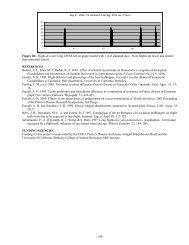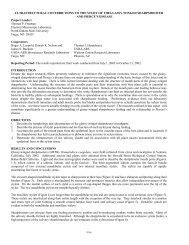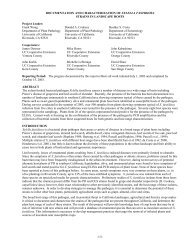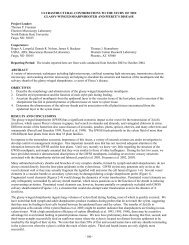Impact Of Host Plant Xylem Fluid On Xylella Fastidiosa Multiplication ...
Impact Of Host Plant Xylem Fluid On Xylella Fastidiosa Multiplication ...
Impact Of Host Plant Xylem Fluid On Xylella Fastidiosa Multiplication ...
Create successful ePaper yourself
Turn your PDF publications into a flip-book with our unique Google optimized e-Paper software.
Project Leader:<br />
Doug Cook<br />
Dept. of <strong>Plant</strong> Pathology<br />
University of California<br />
Davis, CA 95616<br />
FUNCTIONAL GENOMICS OF THE GRAPE-XYLELLA INTERACTION: TOWARDS<br />
THE IDENTIFICATION OF HOST RESISTANCE DETERMINANTS<br />
Cooperators:<br />
David Gilchrist<br />
Dept. of <strong>Plant</strong> Pathology<br />
University of California<br />
Davis, CA 95616<br />
Collaborators:<br />
Choi, H.K., F. Goes da Silva, H. Lim, & J.E. Lincoln<br />
Dept. of <strong>Plant</strong> Pathology<br />
University of California<br />
Davis, CA 95616<br />
Andrew Walker<br />
Dept. of Viticulture and Enology<br />
University of California<br />
Davis, CA 95616<br />
A. Iandolino<br />
Dept. of Viticulture and Enology<br />
University of California<br />
Davis, CA 95616<br />
Reporting Period: The results reported here are from work conducted from July 1, 2003 to June 30, 2004.<br />
ABSTRACT<br />
We have used in silico mining of EST data and Real Time PCR to identify a set of <strong>Xylella</strong>-induced grape genes. Controlled<br />
time course analyses demonstrate that the genes are induced prior to symptom development, in coincidence with pathogen<br />
colonization. Analysis of field samples from grapes under a variety of biotic and abiotic stresses demonstrate that these<br />
genes are up-regulated in response to <strong>Xylella</strong> but not in response to the other pathogens assayed, including common viral,<br />
nematode and fungal pathogens, or by Phylloxera infestation or herbicide damage. By contrast, transcriptional responses<br />
similar to those observed in <strong>Xylella</strong>-infected tissues were observed in grapes under severe drought stress (in excess of normal<br />
field drought) and in plants where the vascular system had been blocked by damage from the grape cane girdler insect. These<br />
results are consistent with transcriptional regulation in response to insult within the vascular tissue of grape, but not to<br />
pathogen infection generally.<br />
INTRODUCTION<br />
All organisms adapt to external stressors by activating the expression of genes that confer adaptation to the particular stress.<br />
For example, when exposed to conditions of heat or drought, genes for adaptation to heat and drought stress are up-regulated.<br />
Similarly, when a plant is exposed to a pathogen, numerous genes are induced including those that encode proteins involved<br />
in disease resistance. In the case of Pierce’s disease, such genes are likely to include those coding for resistance to <strong>Xylella</strong> or<br />
to the insect vector.<br />
Genomics technology offers an opportunity to monitor gene expression changes on a massive scale (so-called "transcriptional<br />
profiling"), with the parallel analysis of thousands of host genes conducted in a single experiment. In the case of Pierce's<br />
disease of grapes, the resulting data can reveal aspects of the host response that are inaccessible by other experimental<br />
strategies. Prior to carrying out transcriptional profiling, it is first necessary to (1) catalog the gene content of grapes by<br />
means of sequencing and bioinformatic analyses, and (2) develop gene-based arrays that allow the simultaneous monitoring<br />
of gene expression for >10,000 genes. Our research to date has contributed significantly in each of these areas. In May of<br />
2004, the first Affymetrix gene chip was made available for public use, with ~15,000 Vitis genes represented. This gene chip<br />
has been developed based primarily on a collaboration between the Cook laboratory and researchers at the University of<br />
Nevada-Reno. With the arrival of the Affymetrix gene chip, we are poised to make a quantum leap in the identification of<br />
host gene expression in response to <strong>Xylella</strong> fastidiosa.<br />
In addition to enumerating differences between susceptible and resistant genotypes of Vitis, the ongoing research will test a<br />
long-standing but largely untested hypothesis that pathogen-induced drought stress is one of the fundamental triggers of PD<br />
symptom development. The utility of this type of data will be to inform the PD research community about the genes and<br />
corresponding protein products that are produced in susceptible, tolerant and resistant interactions. Differences in the<br />
transcriptional profiles between these situations are expected to include host resistance and susceptibility genes, and thus<br />
provide the basis for new lines of experimental inquiry focused on testing the efficacy of specific host genes for PD<br />
resistance. It should be possible, for example, to determine the extent to which resistance responses in grapes are related to<br />
well-characterized defense responses in other plant species [e.g., Maleck et al., 2002; Tao et al., 2003; de Torres et al., 2003].<br />
In addition to identifying candidate effectors of disease resistance, such knowledge would aid the development of testable<br />
hypotheses regarding susceptibility and resistance to <strong>Xylella</strong> fastidiosa in grapes.<br />
- 294 -



